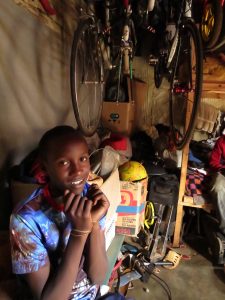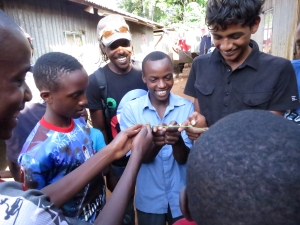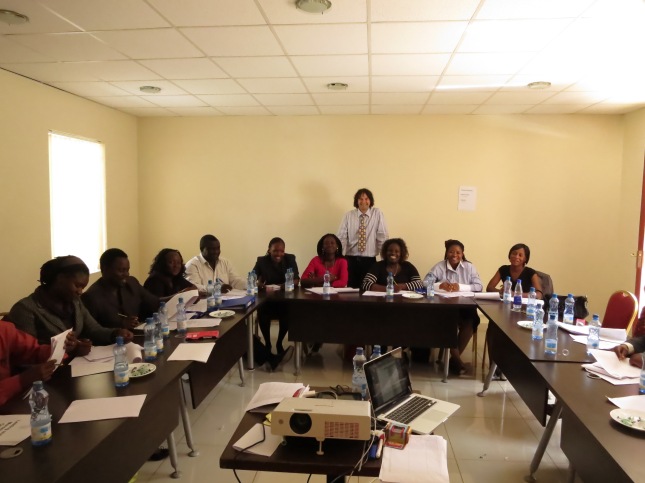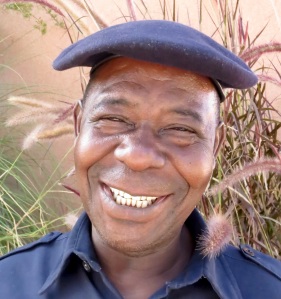“I’m afraid your flight has already left Sir” are words you really don’t want to hear at the airport. A travel agent error meant I had another 24 hours in Nairobi;so, what to do having exhausted most of the interesting tourist options?
Then I read the article on Chris Froome in the Guardian on Saturday, which portrayed a focussed man, beating the odds to get into professional cycling but then being disappointed by heros who had cheated to win. The article mentions his inspirational mentor, a dreadlocked Kenyan cyclist called David Kinjah. I googled Kinja and found a very impressive ex-pro cyclist, also that he gave guided cycling tours in Kikuyu, near Nairobi.
I rang that morning not expecting to be able to arrange anything at such short notice, but he said he’d pick me up later that day. He arrived with a contagious smile in a taxi crammed full of young cyclists and bike gear.
He explained what he was doing with The Safari Simbaz Trust, : realising talent in underprivileged children living in disadvantaged communities around Nairobi and spoke with real pride about the boys and a girl racers in the taxi.
When asked he talked about his past in the Commonwealth Games and as a pro- cyclist in the early 2000’s, but was keener to talk about the project. We arrived down an unpaved road to his house in Kikuyu. What became immediately obvious was that his house was not just his house, it was also a hostel to his ‘boys’ many of whom had very challenging home lives; the rooms were also packed with cycling kit.
At this point the comparison with Lance Armstrong kicked in. Whatever the debate on Armstrong, certain things are undeniable: he raised the profile of cycling unbelievably, made huge amounts of money for charity, inspired many people and also personally benefited hugely with the fortune and the mansion to prove it.
He inspired people with a lie and lawsuits will inevitably follow to dent his fortune, but the greatest punishment of all is that one that can crush: his 13 year old son will never feel the same about him and that is a lifetime sentence.
David doesn’t condemn Armstrong, but the contrast could not be greater, Davids’ life is no more privileged than that of the young people he supports, he doesn’t seek fame and fortune, but simply to make a difference to his community. He wants his riders to be intelligent, not just fast. I work for the Institute of Physics and teach science through extreme sports as part of my role, so taught them some science to understand forces. Their original shyness gone, they become a normal boisterous class of boys. I then relate what they have learned to cycling and they are rapt, impressive in their understanding and application of the ideas.
We then go for a ride, you can go as gently or as fast as you want. You are left with no idea how fast David can go as he simply stays with you but he certainly didn’t break into a sweat keeping up with me. I have 30 years experience as a mountain biker, although that really is one year of experience repeated thirty times! What becomes apparent as we reach the first hill is how fast these boys are, they simply fly up them.
We pass people working the fields, collecting wood, donkeys with carts and children playing. We see the beauty of Africa as it really is. The route can be as challenging or as easy as you want.
Not content with changing the lives of his cyclists, David also runs three football teams, so we stop on a dusty pitch and lads appear from all directions. The cyclists take on the footballers and I join them. What is clear is there are some very talented players, many of these boys have very difficult home lives and this provides a structure to their day . David laments their inability to play as a team and wants them to become better thinkers, but is most concerned about keeping them on the straight and narrow.
A few of the boys have boots that David bought for them , but even worn boots fetch a premium price on the markets and he simply cannot afford them for all, none have shin pads.
We play until the sun goes down, David keeping order and being a strong role model. The sun goes down and we reluctantly stop. “Bring Rooney next time” one of the boys shouts.
We cycle back lit by a full moon.
Unforgettable, magical and truly inspirational!
What can we do to help this project? Can twitter/social media be used? David is possibly the most inspirational man I have ever met.
I’d like to arrange something to get football boots/kit etc out there.
I also want funding for a set of mountain bikes for tourists to ride that would bring in a source of income for David and his boys. I am a Mountain Bike Leader and would like to help set up a few routes and ensure safety procedures etc are in place; also get the boys trained up in this.
This model could be replicated as an eco friendly sustainable project but these are all out of the realms of my expertise – I’m just a science teacher. Has anyone out there got any ideas?
Neil Atkin
function twitter_button() {
if (is_single()) { ?>
<?php }
}
add_action(‘thesis_hook_before_headline’, ‘twitter_button’);







